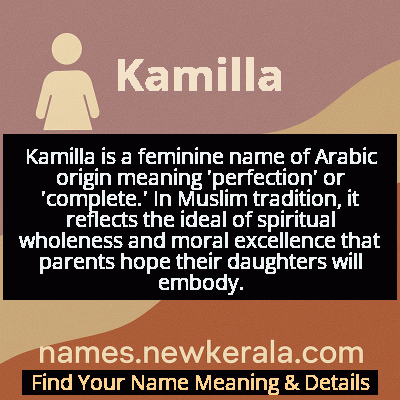Kamilla Name Meaning & Details
Origin, Popularity, Numerology Analysis & Name Meaning of Kamilla
Discover the origin, meaning, and cultural significance of the name KAMILLA. Delve into its historical roots and explore the lasting impact it has had on communities and traditions.
Name
Kamilla
Gender
Female
Origin
Muslim
Lucky Number
5
Meaning of the Name - Kamilla
Kamilla is a feminine name of Arabic origin meaning 'perfection' or 'complete.' In Muslim tradition, it reflects the ideal of spiritual wholeness and moral excellence that parents hope their daughters will embody.
Kamilla - Complete Numerology Analysis
Your Numerology Number
Based on Pythagorean Numerology System
Ruling Planet
Mercury
Positive Nature
Adventurous, dynamic, curious, and social.
Negative Traits
Restless, impatient, inconsistent, prone to indulgence.
Lucky Colours
Green, white.
Lucky Days
Wednesday.
Lucky Stones
Emerald.
Harmony Numbers
1, 3, 9.
Best Suited Professions
Sales, marketing, travel, entertainment.
What People Like About You
Versatility, charisma, adventurous spirit.
Famous People Named Kamilla
Kamilla Cardoso
Basketball Player
Professional basketball player for South Carolina Gamecocks and Brazilian national team
Kamilla Gafurzyanova
Model
International fashion model working with major global brands
Kamilla Senjo
Actress
Danish actress known for roles in Scandinavian film and television
Kamilla Kowal
Beauty Queen
Polish beauty pageant titleholder representing Poland internationally
Name Variations & International Equivalents
Click on blue names to explore their detailed meanings. Gray names with will be available soon.
Cultural & Historical Significance
Beyond the Islamic world, Kamilla shares roots with the Roman name Camilla, from the legendary warrior maiden in Virgil's Aeneid. This dual heritage creates a rich cultural tapestry that bridges Eastern and Western traditions. In contemporary global culture, the name serves as a beautiful example of cross-cultural exchange, maintaining its religious significance while also appealing to broader audiences for its melodic quality and positive meaning. The name's adaptability across different languages and cultures has contributed to its enduring popularity and cultural relevance.
Extended Personality Analysis
Women named Kamilla are typically associated with qualities of perfectionism, integrity, and emotional depth. They often exhibit a strong sense of responsibility and attention to detail, reflecting the name's meaning of 'perfection.' These individuals tend to be highly organized and methodical in their approach to life, with a natural inclination toward excellence in their personal and professional endeavors. Their pursuit of completeness often makes them thorough in their work and committed in their relationships.
Kamillas are frequently described as having a calming presence and natural grace that puts others at ease. They possess strong intuitive abilities and emotional intelligence, allowing them to understand and support those around them effectively. Many display a unique blend of traditional values and modern thinking, making them adaptable to various social situations. Their name suggests someone who brings wholeness to situations and people, often acting as peacemakers or unifiers in group dynamics. The combination of their meticulous nature and compassionate heart makes them both reliable friends and effective leaders.
Modern Usage & Popularity
In modern times, Kamilla has experienced growing popularity as a cross-cultural name choice that appeals to diverse audiences. The name maintains strong roots in Muslim communities worldwide while increasingly appearing in Western countries where multicultural names are valued. Recent decades have seen steady usage in Europe, particularly in Scandinavian countries and Eastern Europe, as well as growing recognition in North America. The name's appeal lies in its elegant pronunciation, positive meaning, and ability to bridge cultural traditions without losing its distinctive character. Current naming trends show Kamilla ranking moderately in popularity charts across multiple countries, with particular strength in nations with significant Muslim populations and among parents seeking names that honor both heritage and contemporary sensibilities. Its versatility allows it to fit seamlessly into various cultural contexts while maintaining its essential meaning and identity.
Symbolic & Spiritual Meanings
Symbolically, Kamilla represents the universal human aspiration toward completeness and ideal form. The name embodies the concept of spiritual and personal wholeness, suggesting an individual who integrates diverse aspects of their being into a harmonious unity. It symbolizes the journey of self-refinement and the pursuit of excellence in character, intellect, and spirit. In metaphorical terms, Kamilla represents the bridge between earthly existence and higher ideals, embodying the potential for human perfection within the context of everyday life. The name carries connotations of beauty that transcends physical appearance to encompass moral integrity, wisdom, and emotional depth. It also symbolizes resilience and strength, as the path to completeness often requires overcoming challenges and integrating life's experiences into a meaningful whole. Ultimately, Kamilla represents the ideal of balanced perfection—someone who brings completion and harmony to whatever they touch.

